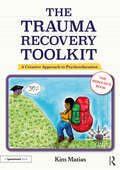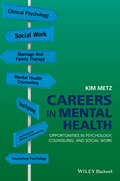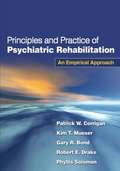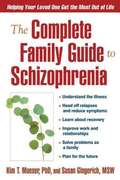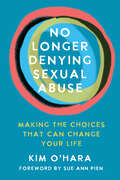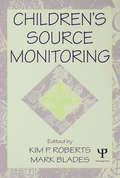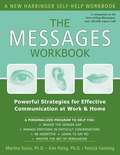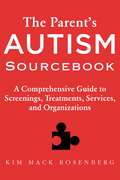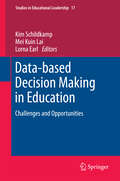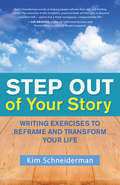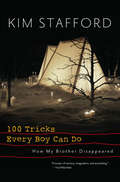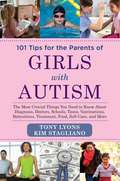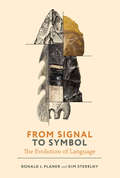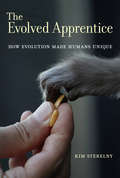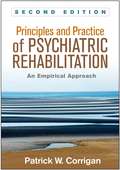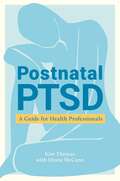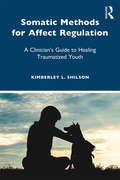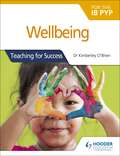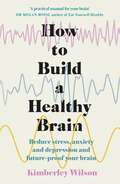- Table View
- List View
The Trauma Recovery Toolkit: A Creative Approach to Psychoeducation (The Trauma Recovery Toolkit)
by Kim MatiasThis guidebook is part of The Trauma Recovery Toolkit and needs to be purchased alongside the flashcards for full and effective use. Both can be purchased together as a set: 978-0-367-54690-8 This guidebook is part of The Trauma Recovery Toolkit, a guidebook and flashcard set that has been created to empower individuals living with the effects of trauma and the mental health professionals that support them. Inspired by the latest research surrounding mindfulness, self-compassion, neuroscience and trauma recovery, the resource explores the effect of trauma on the brain and body and offers strategies which may be helpful in combatting the symptoms. The flashcard format enables trauma survivors to creatively respond to visual aids and prompts in a way that is comfortable for them, providing mental health professionals with a more creative and person-centred approach to directing clients towards their own healing journey. This resource comprises: • 38 colourful flashcards that can be used as standalone visual aids or as a platform for creative responses • A guidebook delving into the individual cards, their meaning and symbolism, and the research behind them • Additional resources to support the client’s development of their own personalised cards. Weaving together psychoeducation, creativity, symbolism, and the latest neuroscientific research, this essential toolkit offers all professionals working in mental health services a creative way to engage clients with therapy, empowering them to develop habits and ways of being that can support their recovery. Intended for use in educational settings and/or therapy contexts under the supervision of an adult. This is not a toy.
The Trauma Recovery Toolkit: A Creative Approach to Psychoeducation (The Trauma Recovery Toolkit)
by Kim MatiasThis guidebook is part of The Trauma Recovery Toolkit and needs to be purchased alongside the flashcards for full and effective use. Both can be purchased together as a set: 978-0-367-54690-8This guidebook is part of The Trauma Recovery Toolkit, a guidebook and flashcard set that has been created to empower individuals living with the effects of trauma and the mental health professionals that support them.Inspired by the latest research surrounding mindfulness, self-compassion, neuroscience and trauma recovery, the resource explores the effect of trauma on the brain and body and offers strategies which may be helpful in combatting the symptoms. The flashcard format enables trauma survivors to creatively respond to visual aids and prompts in a way that is comfortable for them, providing mental health professionals with a more creative and person-centred approach to directing clients towards their own healing journey.This resource comprises: 38 colourful flashcards that can be used as standalone visual aids or as a platform for creative responses A guidebook delving into the individual cards, their meaning and symbolism, and the research behind them Additional resources to support the client’s development of their own personalised cards Weaving together psychoeducation, creativity, symbolism, and the latest neuroscientific research, this essential toolkit offers all professionals working in mental health services a creative way to engage clients with therapy, empowering them to develop habits and ways of being that can support their recovery.Intended for use in educational settings and/or therapy contexts under the supervision of an adult. This is not a toy.
Careers in Mental Health: Opportunities in Psychology, Counseling, and Social Work
by Kim MetzAccessible and unbiased, Careers in Mental Health introduces upper-level high school students and beginning undergraduates to the different aspects of various mental health professions. Contains essential career advice for anyone considering an advanced degree in one of the “helping” professions within mental health Covers clinical psychology, counseling psychology, social work, counseling, marriage and family therapy, substance abuse counseling, and school psychology Clarifies the distinctions between professions by discussing the history and philosophy of each field, requirements for advanced education, licensing, available jobs, salary potential, and more Includes a section with practical information applicable to all the professions, such as characteristics for success, ethical issues, the importance of critical thinking, applying to graduate school, and current issues affecting the field of mental health
Principles and Practice of Psychiatric Rehabilitation
by Kim Mueser Patrick CorriganThis comprehensive, authoritative text provides a state-of-the-art review of current knowledge and best practices for helping adults with psychiatric disabilities move forward in their recovery process. The authors draw on extensive research and clinical expertise to accessibly describe the "whats," "whys," and "how-tos" of psychiatric rehabilitation. Coverage includes tools and strategies for assessing clients' needs and strengths, integrating medical and psychosocial interventions, and implementing supportive services in such areas as housing, employment, social networks, education, and physical health. Detailed case examples in every chapter illustrate both the real-world challenges of severe mental illness and the nuts and bolts of effective interventions.
The Complete Family Guide to Schizophrenia: Helping Your Loved One Get the Most Out of Life
by Kim Mueser Susan GingerichWill the person you love ever get better? Chances are you've grappled with the question. With care and support from their families, people with schizophrenia can and do make vast improvements. Noted therapists Kim Mueser and Susan Gingerich deepen your understanding of the illness and cover a wide range of effective treatments. Based on decades of research and experience, they offer pragmatic suggestions for dealing with depression, psychosis, and other symptoms. They show you how to prioritize needs, resolve everyday problems, and encourage your loved one to set life goals. Plus, individual sections highlight special issues for parents, children, siblings, and partners. Whether you're facing schizophrenia for the first time or you've dealt with its impact for years, you'll discover innovative ways to handle challenges that arise over the course of treatment, from reducing the chances of relapse to making friends and finding work. Recovery isn't an endpoint--it's a lifelong journey. With love, hope, and realistic optimism, striving for it can lead to a richer, more rewarding life for your entire family.
All of Me: How I Learned to Live with the Many Personalities Sharing My Body
by Kim NobleTaking the reader through an extraordinary world where the very nature of reality is different, this personal narrative tells the story of one woman's terrifying battle to understand her own mind. From the desperate struggle to win back the child she loves to the courage and commitment needed to make sense of her life, this account recalls Kim Noble's many years in and out of mental institutions and various diagnoses until finally being appropriately diagnosed with dissociative identity disorder (DID). Described as a creative way some minds cope with unbearable pain, DID causes Kim's body to play host to more than 20 different personalities--from a little boy who speaks only Latin and an elective mute to a gay man and an anorexic teenager. Sometimes funny and ultimately uplifting, this brave illumination of the links and intersections between memory, mental illness, and creativity offers a glimpse into the mind of someone with DID and helps readers understand the confusion, frustration, and everyday difficulties in living with this disorder.
No Longer Denying Sexual Abuse: Making the Choices That Can Change Your Life
by Kim O'HaraWe spend a majority of our lives as survivors with no clue what we are actually surviving. To protect us, our brains have frozen in time the incidents fueling our ability to be in denial. Unfortunately, the truth of our sexual abuse seeps out into all areas of our lives, causing us to behave like maligned versions of our true selves. We yell, when we are not yellers. We cheat, when we want love. We drink and abuse drugs when we want to see God. Only through facing the denial do we find our true selves hidden in the cobwebs.
Children's Source Monitoring
by Mark Blades Kim P. RobertsThere are many aspects of life which require us to distinguish between memories of different events, such as deciding whether you locked the door or only intended to lock the door. Source monitoring, or identifying the source of a particular memory (was the event experienced? related by someone else? or simply imagined?) is a cognitive skill that develops across the life span. In this book, the first to integrate research on children's source monitoring, readers will find an accessible overview of source-monitoring theory and findings from the research programs of leading investigators in this area. The programs of research cut across different methodologies (e.g., nomothetic, individual differences, clinical) and are applied to a wide range of issues in children's lives. Particular emphasis is placed on the effects of source monitoring on eyewitness memory and identification, learning and knowledge, and the development of a theory of mind.
The Messages Workbook: Powerful Strategies For Effective Communication At Work And Home
by Patrick Fanning Martha Davis Kim PalegSimply put, skill at communicating with others is the single largest determinant of anyone's happiness, and success. Rewarding and lucrative careers, strong and lasting friendships, meaningful and satisfying romance all hang on this one uniquely human ability. You need strong communication skills to survive. The better able you are to communicate with others, the happier and more successful you will be.
Victorious Heart: Finding Hope and Healing After a Devastating Loss
by Kim PeacockA mother shares how God&’s grace helped her through the loss of her child in this memoir of faith, healing, and hope in the midst of tragedy. Losing a loved one can leave you feeling broken, but grief is not something that can be fixed or cured. It is the experience of missing a part of yourself. In Victorious Heart, Kim Peacock openly recounts the devastating loss of her oldest daughter, Nicole, and reveals how the Lord carried her through―and is still carrying her through―the deepest sorrow of her life. For others who are experiencing terrible grief, Victorious Heart offers consolation and wisdom. Kim shares how she managed some of the difficult &“firsts&” like birthdays and holidays, and how she learned to avoid the &“Blame Game.&” Grieving family members learn that it will be okay to laugh again and that they too can have a Victorious Heart.
Parent's Autism Sourcebook: A Comprehensive Guide to Screenings, Treatments, Services, and Organizations
by Kim RosenbergA one-stop compendium for parents of children with autism. The most recent studies estimate that 1 in 68 children in America are on the autism spectrum. For the parents and families of these children, having support is vital. But the search for the right information can be difficult, and it may be even harder to find the time for the research that is needed. The Parent’s Autism Sourcebook brings that information to you, offering families of children with autism a full range of up-to-date resources on diagnoses, doctors, organizations, and much more. Whether you are concerned about finding the right school, possible treatment options, methods for social interaction, or are just looking for the support of other parents of children with autism, this book can help you find what you need. The resources gathered from across the nation in this comprehensive sourcebook include information on: Evaluation and screening methods Specialized doctors and clinics Schools and social groups Potential treatments and interventions Legal services and consultation And more Raising a child on the autism spectrum can present unique challenges for parents. Finding the resources and support they need shouldn’t be one of them. The Parent’s Autism Sourcebook will help families everywhere.
Data-based Decision Making in Education: Challenges and Opportunities (Studies in Educational Leadership #17)
by Mei Kuin Lai Lorna Earl Kim SchildkampIn a context where schools are held more and more accountable for the education they provide, data-based decision making has become increasingly important. This book brings together scholars from several countries to examine data-based decision making. Data-based decision making in this book refers to making decisions based on a broad range of evidence, such as scores on students' assessments, classroom observations etc. This book supports policy-makers, people working with schools, researchers and school leaders and teachers in the use of data, by bringing together the current research conducted on data use across multiple countries into a single volume. Some of these studies are 'best practice' studies, where effective data use has led to improvements in student learning. Others provide insight into challenges in both policy and practice environments. Each of them draws on research and literature in the field.
Step Out of Your Story: Writing Exercises to Reframe and Transform Your Life
by Kim SchneidermanREFRAME YOUR STORY, RECLAIM YOUR LIFE Every day we relate stories about our highs and lows, relationships and jobs, heartaches and joys. But do we ever consider the choices we make about how to tell our story? In this groundbreaking book, Kim Schneiderman shows us that by choosing a version that values life lessons and meaningful personal victories we can redirect our energy and narrative toward our desires and goals. It presents character development workouts and life-affirming, liberating exercises for retelling our stories to find redemptive silver linings and reshape our lives. As both a therapist and a writer, Schneiderman knows the power of story. By employing the storytelling techniques she offers, you’ll learn to view your life as a work in progress and understand big-picture story lines in ways that allow you to easily steer your actions and relationships toward redefined — and realistic — “happy endings.”
100 Tricks Every Boy Can Do
by Kim StaffordBret and Kim Stafford, the oldest children of the poet and pacifist William Stafford, were pals. Bret was the good son, the obedient public servant, Kim the itinerant wanderer. In this family of two parent teachers, with its intermittent celebration of "talking recklessly," there was a code of silence about hard things: "Why tell what hurts?" As childhood pleasures ebbed, this reticence took its toll on Bret, unable to reveal his troubles. Against a backdrop of the 1960s - puritan in the summer of love, pacifist in the Vietnam era - Bret became a casualty of his interior war and took his life in 1988. 100 Tricks Every Boy Can Do casts spells in search of the lost brother: climbing the water tower to stand naked under the moon, cowboys and Indians with real bullets, breaking into church to play a serenade for God, struggling for love, and making bail. In this book, through a brother's devotions, the lost saint teaches us about depression, the tender ancestry of violence, the quest for harmonious relations, and finally the trick of joy.
100 Tricks Every Boy Can Do
by Kim StaffordBret and Kim Stafford, the oldest children of the poet and pacifist William Stafford, were pals. Bret was the good son, the obedient public servant, Kim the itinerant wanderer. In this family of two parent teachers, with its intermittent celebration of "talking recklessly," there was a code of silence about hard things: "Why tell what hurts?" As childhood pleasures ebbed, this reticence took its toll on Bret, unable to reveal his troubles. Against a backdrop of the 1960s - puritan in the summer of love, pacifist in the Vietnam era - Bret became a casualty of his interior war and took his life in 1988. 100 Tricks Every Boy Can Do casts spells in search of the lost brother: climbing the water tower to stand naked under the moon, cowboys and Indians with real bullets, breaking into church to play a serenade for God, struggling for love, and making bail. In this book, through a brother's devotions, the lost saint teaches us about depression, the tender ancestry of violence, the quest for harmonious relations, and finally the trick of joy.
101 Tips for the Parents of Girls with Autism: The Most Crucial Things You Need to Know About Diagnosis, Doctors, Schools, Taxes, Vaccinations, Babysitters, Treatment, Food, Self-Care, and More
by Tony Lyons Kim StaglianoThe latest research shows that as many as 1 in 88 US children now has autism, and the number keeps rising. Parents of these children become full-time researchers, always looking for the latest information on doctors, education, and treatments, and parents of girls with autism face particularly unique challenges. After countless hours of study, Tony Lyons is sharing what he has learned. In 101 Tips for the Parents of Girls with Autism you will learn how to deal with troubling issues such as periods, birth control, and the risks of sexual abuse. Both Mom and Dad will learn which menstrual pads work best and why the ones with wings just are not them. And how exactly do you get your daughter to actually start using them? 101 Tips for the Parents of Girls with Autism has the answer. Other topics include: How to get the most useful evaluation Where to find other parents of girls with autism Getting insurance to cover treatments Coping with the unique social issues that girls face Legal issues and Medicaid pros and cons Maintaining a social life for both you and your daughter Handling marital stress and divorce Where to go on vacation And many more! From what to do when you first suspect your daughter might have autism, to coping with the first diagnosis, following up with comprehensive evaluation, and pursuing education and treatment, 101 Tips for the Parents of Girls with Autism is the book that every parent of a girl with autism needs.
From Signal to Symbol: The Evolution of Language (Life and Mind: Philosophical Issues in Biology and Psychology)
by Kim Sterelny Ronald PlanerA novel account of the evolution of language and the cognitive capacities on which language depends.In From Signal to Symbol, Ronald Planer and Kim Sterelny propose a novel theory of language: that modern language is the product of a long series of increasingly rich protolanguages evolving over the last two million years. Arguing that language and cognition coevolved, they give a central role to archaeological evidence and attempt to infer cognitive capacities on the basis of that evidence, which they link in turn to communicative capacities. Countering other accounts, which move directly from archaeological traces to language, Planer and Sterelny show that rudimentary forms of many of the elements on which language depends can be found in the great apes and were part of the equipment of the earliest species in our lineage. After outlining the constraints a theory of the evolution of language should satisfy and filling in the details of their model, they take up the evolution of words, composite utterances, and hierarchical structure. They consider the transition from a predominantly gestural to a predominantly vocal form of language and discuss the economic and social factors that led to language. Finally, they evaluate their theory in terms of the constraints previously laid out.
The Evolved Apprentice: How Evolution Made Humans Unique (Jean Nicod Lectures)
by Kim SterelnyA new theory of the evolution of human cognition and human social life that emphasizes the role of information sharing across generations.Over the last three million years or so, our lineage has diverged sharply from those of our great ape relatives. Change has been rapid (in evolutionary terms) and pervasive. Morphology, life history, social life, sexual behavior, and foraging patterns have all shifted sharply away from those of the other great apes. In The Evolved Apprentice, Kim Sterelny argues that the divergence stems from the fact that humans gradually came to enrich the learning environment of the next generation. Humans came to cooperate in sharing information, and to cooperate ecologically and reproductively as well, and these changes initiated positive feedback loops that drove us further from other great apes. Sterelny develops a new theory of the evolution of human cognition and human social life that emphasizes the gradual evolution of information-sharing practices across generations and how these practices transformed human minds and social lives. Sterelny proposes that humans developed a new form of ecological interaction with their environment, cooperative foraging. The ability to cope with the immense variety of human ancestral environments and social forms, he argues, depended not just on adapted minds but also on adapted developmental environments.
Principles and Practice of Psychiatric Rehabilitation, Second Edition: An Empirical Approach
by Patrick W. Corrigan Kim T. MueserThe authoritative text on psychiatric rehabilitation, this book covers everything from conceptual and empirical foundations to exemplary program models. Students and practitioners gain the knowledge needed to help adults with psychiatric disabilities move forward in their recovery process and build personally satisfying lives. The book presents tools and strategies for assessing personal needs and strengths, integrating medical and psychosocial interventions, and implementing supportive services in such areas as housing, employment, education, substance abuse, and physical health. Numerous case examples illustrate both the real-world challenges of serious mental illness and the difference that effective interventions can make. New to This Edition *Incorporates the latest concepts and evidence-based interventions. *Streamlined chapter organization: more concise, yet still comprehensive. *Heightened focus on empowerment, self-determination, and wellness promotion. *New or expanded discussions of the "housing-first" model, harm reduction, peer services and support, and the Affordable Care Act.
The Complete Family Guide to Schizophrenia
by Susan Gingerich Kim T. MueserWill the person you love ever get better? Chances are you've grappled with the question. With care and support from their families, people with schizophrenia can and do make vast improvements. Noted therapists Kim Mueser and Susan Gingerich deepen your understanding of the illness and cover a wide range of effective treatments. Based on decades of research and experience, they offer pragmatic suggestions for dealing with depression, psychosis, and other symptoms. They show you how to prioritize needs, resolve everyday problems, and encourage your loved one to set life goals. Plus, individual sections highlight special issues for parents, children, siblings, and partners. Whether you're facing schizophrenia for the first time or you've dealt with its impact for years, you'll discover innovative ways to handle challenges that arise over the course of treatment, from reducing the chances of relapse to making friends and finding work. Recovery isn't an endpoint--it's a lifelong journey. With love, hope, and realistic optimism, striving for it can lead to a richer, more rewarding life for your entire family. Winner, NAMI/Ken Book Award
Postnatal PTSD: A Guide for Health Professionals
by Kim Thomas Shona McCannPostnatal PTSD, often referred to as birth trauma, is an underdiagnosed and misunderstood condition. Often mistaken for postnatal depression and with 4% of women developing the condition after giving birth, it is essential that health professionals learn to recognise and prevent postnatal PTSD.The book supports professionals to better understand, recognise, treat and help prevent birth trauma. It covers the impact of postnatal PTSD on bonding and relationships, birth trauma in Black, Asian and minority ethnic communities, how to support women having another baby and more.An accessible guide to supporting parents with postnatal PTSD, this book is essential reading for healthcare professionals and those involved with the birthing process.
Somatic Methods for Affect Regulation: A Clinician’s Guide to Healing Traumatized Youth
by Kimberley L. ShilsonSomatic Methods for Affect Regulation is a unique resource that presents a variety of approaches for working somatically with youth. Chapters provide an overview of the relevant neuroscience research with a specific focus on affect regulation. The somatic techniques showcased in the book are evidence-based and illustrated with case studies showing their impact. Importantly, the chapters are also chock full of practical information, including strategies for working with dysregulated youth, information for collaborative and cooperative care, and an appendix with checklists and worksheets to help clinicians plan, guide, and assess their work.
Wellbeing for the IB PYP: Teaching for Success
by Kimberley O'BrienTeach for success and implement effective strategies to create flexible, inviting and intentional learning spaces - essential for supporting physical and emotional wellbeing. - Offers guidance on how to support emotional wellbeing with dedicated chapters on Mindfulness, anxiety and stress and the importance of wellbeing and PSEL. - Helps develop fully rounded and responsible learners with exploration of the lB Learner Profile and ATL skills of social, communication and self-management skills with case studies and Dr Kimberley's Top 5 Tips. - Provides a collaborative approach to wellbeing with storybooks (PYP Friends) and workbooks (PYP ATL Skills Workbooks) that can be used alongside this resource to develop your students social and emotional wellbeing.
How to Build a Healthy Brain: Reduce stress, anxiety and depression and future-proof your brain
by Kimberley Wilson'A practical manual for your brain.' - Dr Megan Rossi, author of Eat Yourself HealthyA groundbreaking science-based guide to protecting your brain health for the long term.Whatever your age, having a healthy brain is the key to a happy and fulfilled life. Yet, for both young and old, diseases of the brain and mental health are the biggest killers in the 21st century. We all know how to take care of our physical health, but we often feel powerless as to what we can do to protect our mental well-being too.How to Build a Healthy Brain is here to help. Written by a passionate advocate for the importance of mental health, Chartered Psychologist Kimberley Wilson draws on the latest research to give practical, holistic advice on how you can protect your brain health by making simple lifestyle choices. With chapters on Sleep, Nutrition, Exercise and Meditation, Kimberley has written an empowering guide to help you look after both your physical and mental well-being.'Finally, a book that puts the brain at the centre of the health conversation, where it belongs.' - Shona Vertue, author of The Vertue Method'A psychologist, she runs a successful private clinic in central London, combining therapy with nutrition advice, and has just written her first (excellent) book, How to Build a Healthy Brain, about protecting our mental wellbeing through factors such as diet, sleep and exercise.' - The Times 'I love your book ... it made me equal parts really excited and passionate, and also pretty angry. The science is there but it isn't being translated. This is a huge area that affects us all ... your book is absolutely brilliant at explaining what we can do to look after our brain health.' - Ella Mills on Deliciously Ella: The Podcast
How to Build a Healthy Brain: Reduce stress, anxiety and depression and future-proof your brain
by Kimberley Wilson'A practical manual for your brain.' - Dr Megan Rossi, author of Eat Yourself HealthyA groundbreaking science-based guide to protecting your brain health for the long term.Whatever your age, having a healthy brain is the key to a happy and fulfilled life. Yet, for both young and old, diseases of the brain and mental health are the biggest killers in the 21st century. We all know how to take care of our physical health, but we often feel powerless as to what we can do to protect our mental well-being too.How to Build a Healthy Brain is here to help. Written by a passionate advocate for the importance of mental health, Chartered Psychologist Kimberley Wilson draws on the latest research to give practical, holistic advice on how you can protect your brain health by making simple lifestyle choices. With chapters on Sleep, Nutrition, Exercise and Meditation, Kimberley has written an empowering guide to help you look after both your physical and mental well-being.'Finally, a book that puts the brain at the centre of the health conversation, where it belongs.' - Shona Vertue, author of The Vertue Method'A psychologist, she runs a successful private clinic in central London, combining therapy with nutrition advice, and has just written her first (excellent) book, How to Build a Healthy Brain, about protecting our mental wellbeing through factors such as diet, sleep and exercise.' - The Times 'I love your book ... it made me equal parts really excited and passionate, and also pretty angry. The science is there but it isn't being translated. This is a huge area that affects us all ... your book is absolutely brilliant at explaining what we can do to look after our brain health.' - Ella Mills on Deliciously Ella: The Podcast
